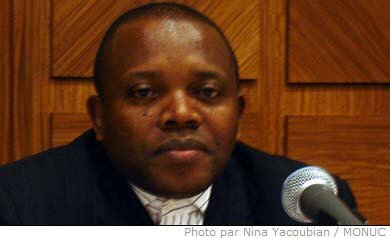
Reacting to the mounting opposition against the timetable released by the Independent Electoral Commission on Monday, the head of the IEC said on Wednesday that all those opposed to the timetable can seek recourse before the Supreme Court.
“Every citizen is free to petition the Supreme Court if they think that the law has been violated. The IEC will comply with the decision of the Court if it decides otherwise,” Apolinaire Malu Malu told Radio Okapi.
He was responding to charges from opposition parties and civil society organizations that the IEC no longer has the constitutional right to set the electoral calendar after President Joseph Kabila enacted a law creating the new Independent National Electoral Commission (INEC) last month.
The INEC will take over the organization of elections from the IEC when its members are elected from parliamentary groupings affiliated with the ruling majority and the opposition. A new electoral law is also pending before Parliament.
Opposition parties and NGOs have complained that setting the first round of presidential elections on November 27, 2011, violates article 73 of the Constitution, which states that the election must be held 90 days before the incumbent president’s mandate expires.
President Kabila having been sworn into office on December 6, 2006, those opposed to the timetable say that the first round should take place no later than September 6, 2011. They argue that the current timetable will extend the president’s term into 2012 if a second round is necessary, as was the case in 2006.
Malu Malu has claimed that the timetable takes into account logistical and financial challenges and does not violate the Constitution.
On the web: Congo News Agency | Excerpts from Forum des As article
Related articles
- • Felix Tshisekedi Sworn In as DR Congo President (January 24, 2019)
- • Constitutional Court Declares Tshisekedi Winner of Presidential Election (January 19, 2019)
- • Martin Fayulu Challenges Presidential Election Results in Court (January 12, 2019)
- • Felix Tshisekedi Vows to Be the President of All Congolese (January 10, 2019)
- • Martin Fayulu Rejects Presidential Election Results (January 10, 2019)
- • Felix Tshisekedi Elected DR Congo President (January 10, 2019)
- • DR Congo Delays Results of December Election (January 6, 2019)
- • Jean-Pierre Bemba banned from running for president (August 25, 2018)
- • Botswana Urges Joseph Kabila to Step Down (February 26, 2018)
- • No elections in DR Congo in December without electronic voting machines: INEC (February 13, 2018)
- • US Warns DR Congo Against Electronic Voting for Delayed Election (February 12, 2018)
- • Presidential election scheduled for December 23, 2018 (November 5, 2017)
- • Felix Tshisekedi accuses INEC of illegally prolonging Kabila's mandate (October 24, 2017)
- • DRC Seeks Arrest of Presidential Candidate Moise Katumbi (May 19, 2016)
- • Papa Wemba Is Buried in Kinshasa (May 4, 2016)
- • Papa Wemba Awarded Highest National Honor as Thousands Pay Tribute (May 2, 2016)
- • Rights Groups: DR Congo Must Free Pro-democracy Activists (April 13, 2015)
- • Electoral commission sets DR Congo presidential election date (February 12, 2015)
- • Police Open Fire on Crowd Protesting Election Law Change (January 19, 2015)
- • Etienne Tshisekedi Evacuated to Belgium for Medical Treatment (August 16, 2014)
- • Kerry Calls on Kabila to Honor Constitution (May 4, 2014)
- • Kerry in DR Congo for Security Talks (May 3, 2014)
- • DR Congo Takes Chairmanship of COMESA at Summit in Kinshasa (February 26, 2014)
- • DR Congo Honors Nelson Mandela, Hero and Model for Humanity (December 6, 2013)
- • Kabila Congratulates Congo Army for Defeating M23 Rebels (October 30, 2013)
- • DR Congo Eases Process for Starting a New Business (June 3, 2013)
- • Regional Leaders Sign DR Congo Peace Deal (February 24, 2013)
- • The M23 Rebels Want to Overthrow Kabila? Nonsense (November 28, 2012)
- • Protests Against M23 Rebels, Government and UN Spread (November 22, 2012)
- • Thousands Protest M23 Capture of Goma, Turn on Government and UN (November 21, 2012)







